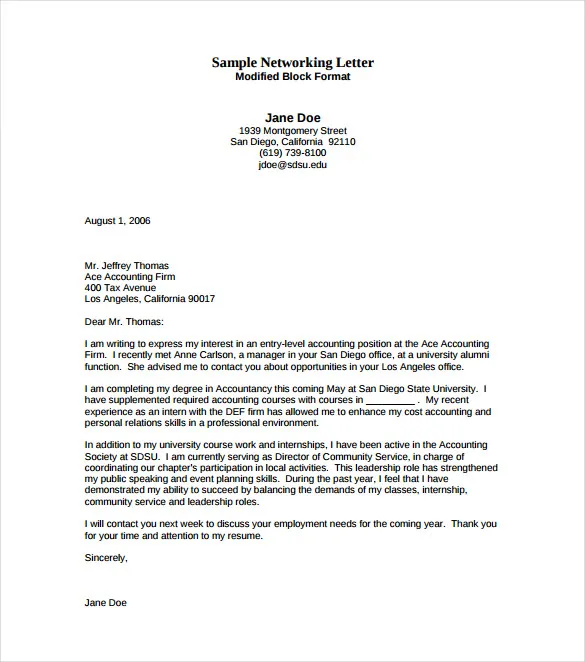Understanding the Importance of an Entry-Level Accounting Cover Letter
In the competitive world of accounting, securing an entry-level position requires more than just a stellar resume. A well-crafted cover letter serves as your first introduction to a potential employer, providing an opportunity to showcase your personality, skills, and enthusiasm for the role. This document isn’t merely a formality; it’s a crucial tool for differentiating yourself from other applicants. A strong cover letter can highlight your suitability for the job and encourage the hiring manager to delve deeper into your qualifications. It’s your chance to make a compelling case and leave a lasting positive impression. Neglecting the cover letter is a missed opportunity to shine and potentially advance your career goals. An excellent cover letter demonstrates your professionalism and attention to detail, qualities highly valued in the accounting field. This also showcases the candidate’s ability to effectively communicate, which is key to the job.
What to Include in Your Entry-Level Accounting Cover Letter
Your Contact Information
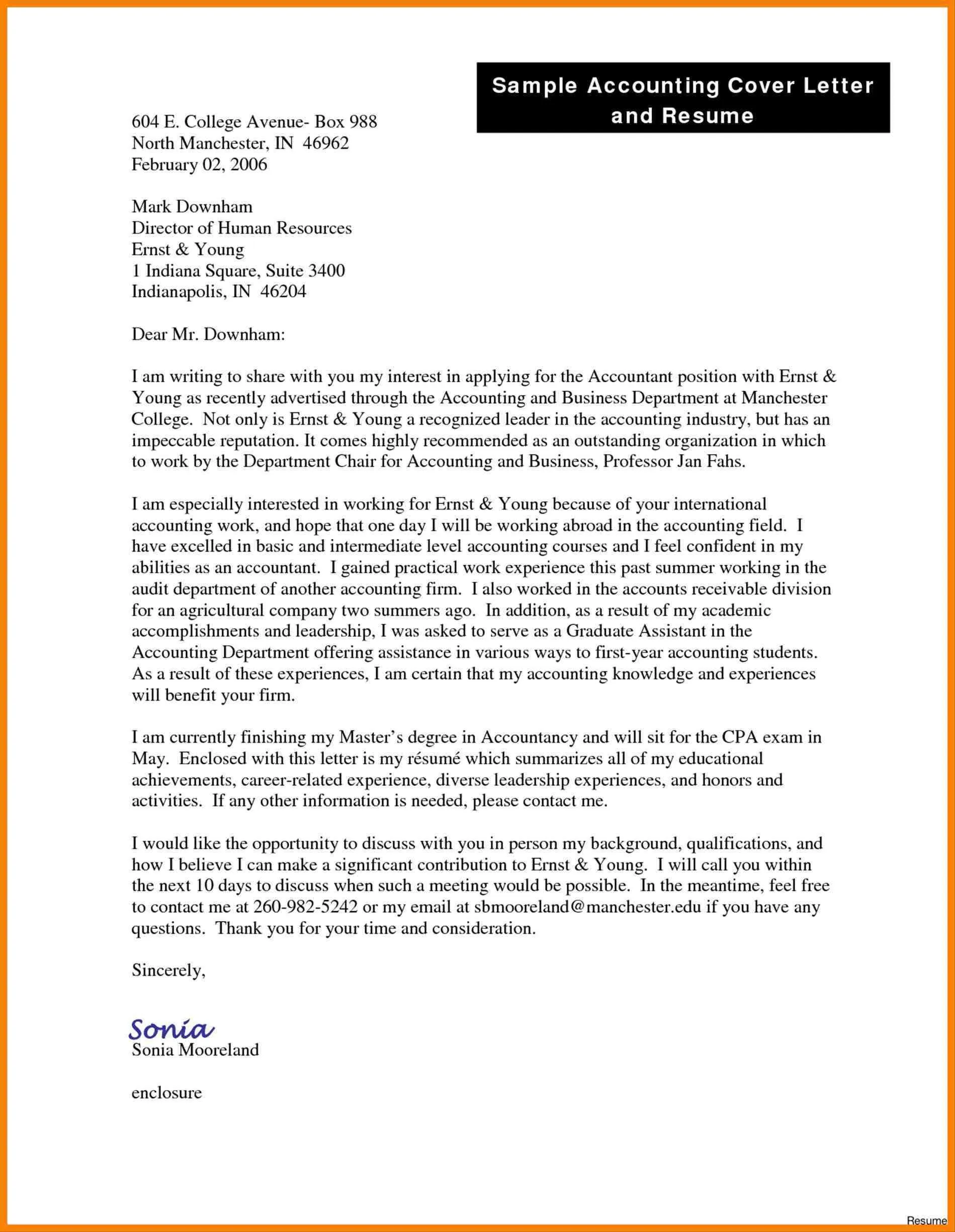
Start your cover letter with your full name, address, phone number, and professional email address. Ensure your email address is appropriate and professional. This information should be clearly displayed at the top of the letter, allowing the employer to easily reach you. Accuracy is key here. Check all details thoroughly before submitting. Consider using a simple, clean font style to maintain a professional appearance. Your contact information sets the stage for the rest of your letter and indicates your preparedness and attention to detail. Also, your address can signal to the employer your location which can be an advantage for local positions.
The Introductory Paragraph
The introductory paragraph should immediately grab the reader’s attention and clearly state the position you’re applying for. Mention where you saw the job posting, if applicable. Briefly highlight your enthusiasm for the company and the specific role. Avoid generic opening lines; instead, express genuine interest in the company’s mission or values. State what you intend to bring to the company. Keep it concise and impactful, setting the tone for the rest of the letter. Make sure the introduction is tailored to the specific company and position, not just a general statement. You want to demonstrate that you understand the role and are ready to contribute to the team. Expressing your excitement for the opportunity is crucial.
Highlighting Your Skills and Qualifications
This section is where you showcase your relevant skills and qualifications. Mention any certifications, software proficiency (e.g., QuickBooks, SAP, Excel), or coursework that aligns with the job requirements. Quantify your achievements whenever possible. For example, ‘Managed a budget of $X’ or ‘Improved efficiency by Y%’. Tailor this section to match the keywords and requirements listed in the job description. This shows you’ve done your research and understand the employer’s needs. If you lack direct work experience, focus on transferable skills like analytical thinking, problem-solving, or attention to detail. This is your opportunity to show how you can benefit the company. Mention the key skills required in the description and explain how you have acquired those.
Showcasing Your Experience
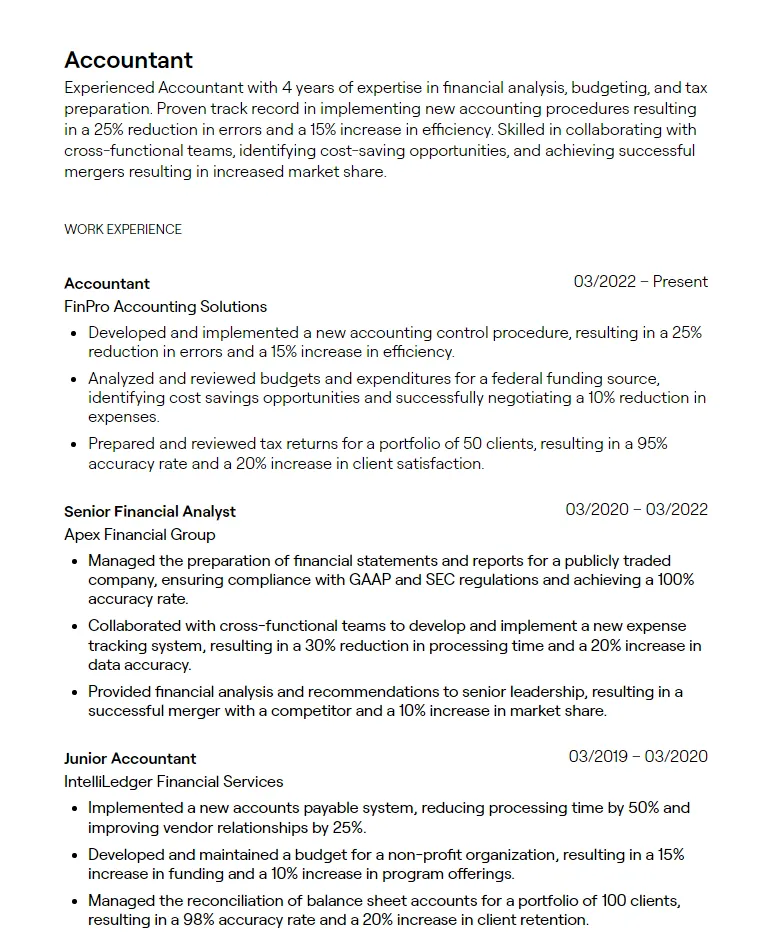
Even without extensive experience, highlight any relevant internships, volunteer work, or academic projects. Describe your responsibilities and accomplishments in these roles. Focus on how your experiences have prepared you for the entry-level position. Use action verbs to describe your tasks and achievements, demonstrating your capabilities and initiative. If you’ve managed projects, mention the outcomes and any positive impact. The aim is to illustrate how you have developed practical skills and can apply them in a professional setting. Your goal is to show how your experiences will enable you to be effective and successful. Provide specific details about each experience, to show how your skills match up with the role. Also, try to quantify your experience, in order to showcase your value to the organization.
Emphasizing Your Enthusiasm and Fit
Show your genuine interest in the company and the role. Research the company’s mission, values, and recent news. Demonstrate that you understand their industry and culture. Explain why you are a good fit for their team and how your career goals align with their objectives. This section is where you connect your skills and experience with the company’s needs. Mention specific projects or aspects of the company that excite you. Highlighting your enthusiasm will show you’re eager to contribute to their success and that you are not just looking for a job, but a long-term career opportunity. It’s also your chance to reiterate why you stand out from other applicants.
The Closing Paragraph
In your closing paragraph, express your gratitude for the reader’s time and consideration. Reiterate your interest in the position and your availability for an interview. Include a call to action, such as ‘I look forward to discussing my qualifications further.’ End with a professional closing (e.g., ‘Sincerely’ or ‘Best regards’) followed by your full name. This is your final chance to make a strong impression, so make it count. Keep it concise and professional, leaving the reader with a positive final impression. Ensure you provide a way to be contacted and available, and thank the reader for their consideration. This also demonstrates professionalism and respect.
Entry-Level Accounting Cover Letter Examples
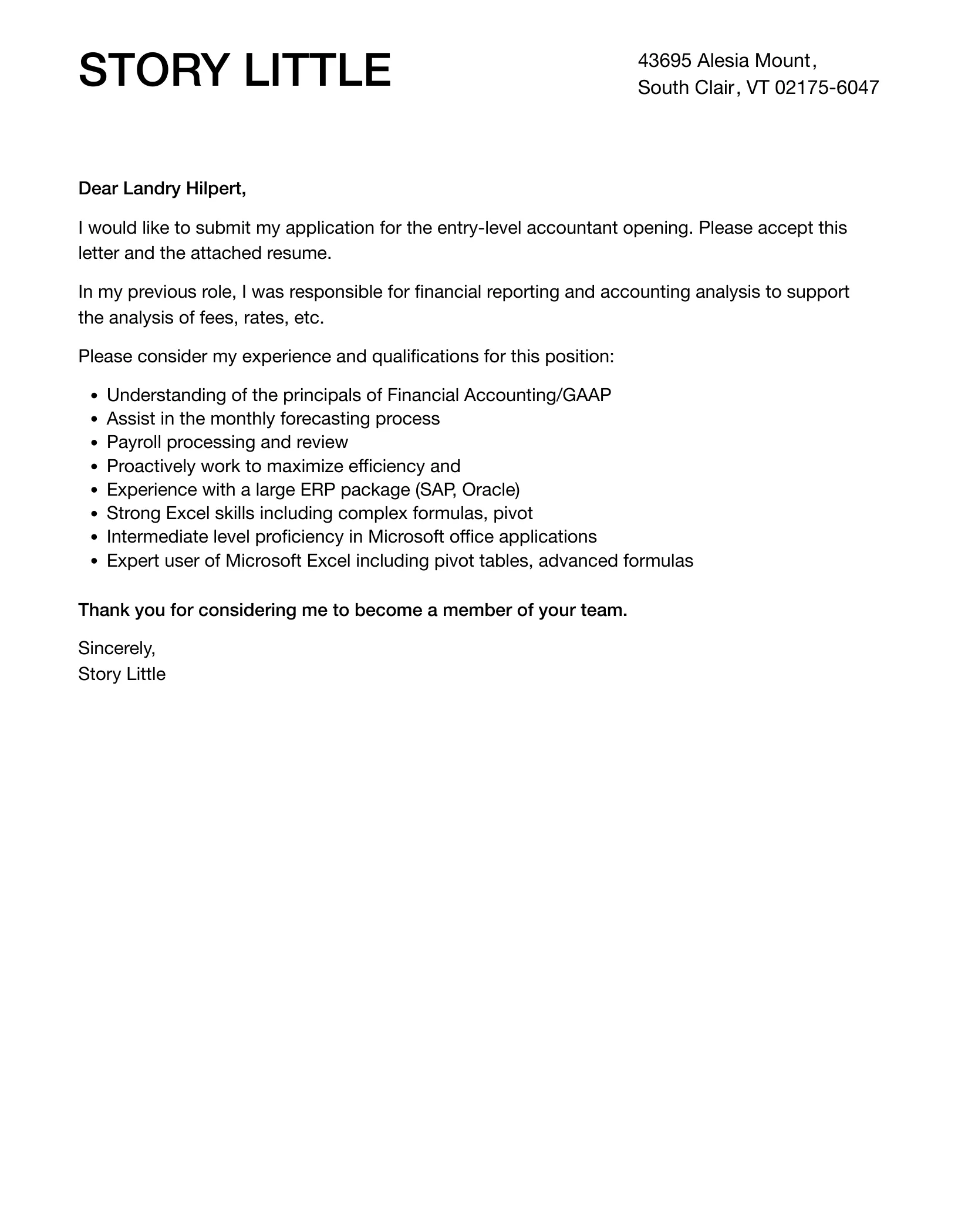
Example 1 Cover Letter for a Staff Accountant
Dear [Hiring Manager Name],
I am writing to express my keen interest in the Staff Accountant position at [Company Name], as advertised on [Platform]. With a Bachelor’s degree in Accounting from [University Name] and a strong foundation in financial reporting, I am eager to contribute to your team. During my internship at [Previous Company], I assisted in preparing monthly financial statements, which involved meticulous data analysis and reconciliation. I’m proficient in [Accounting Software] and possess a strong understanding of GAAP. My goal is to enhance my skills in a professional setting. I am available for an interview and can be reached at [Phone Number] or [Email Address].
Sincerely, [Your Name]
Example 2 Cover Letter for a Junior Accountant
Dear [Hiring Manager Name],
I am applying for the Junior Accountant role at [Company Name], as seen on [Platform]. I hold a degree in Accounting from [University Name] and I am familiar with all principles. Throughout my academic experience, I have developed strong problem-solving abilities and attention to detail. I also handled accounts payable/receivable and monthly reconciliations. These experiences have cultivated my understanding of the accounting cycle. I am enthusiastic about the prospect of applying my skills at [Company Name]. I look forward to the possibility of an interview and can be reached at [Phone Number] or [Email Address].
Sincerely, [Your Name]
Example 3 Cover Letter for an Accounting Assistant
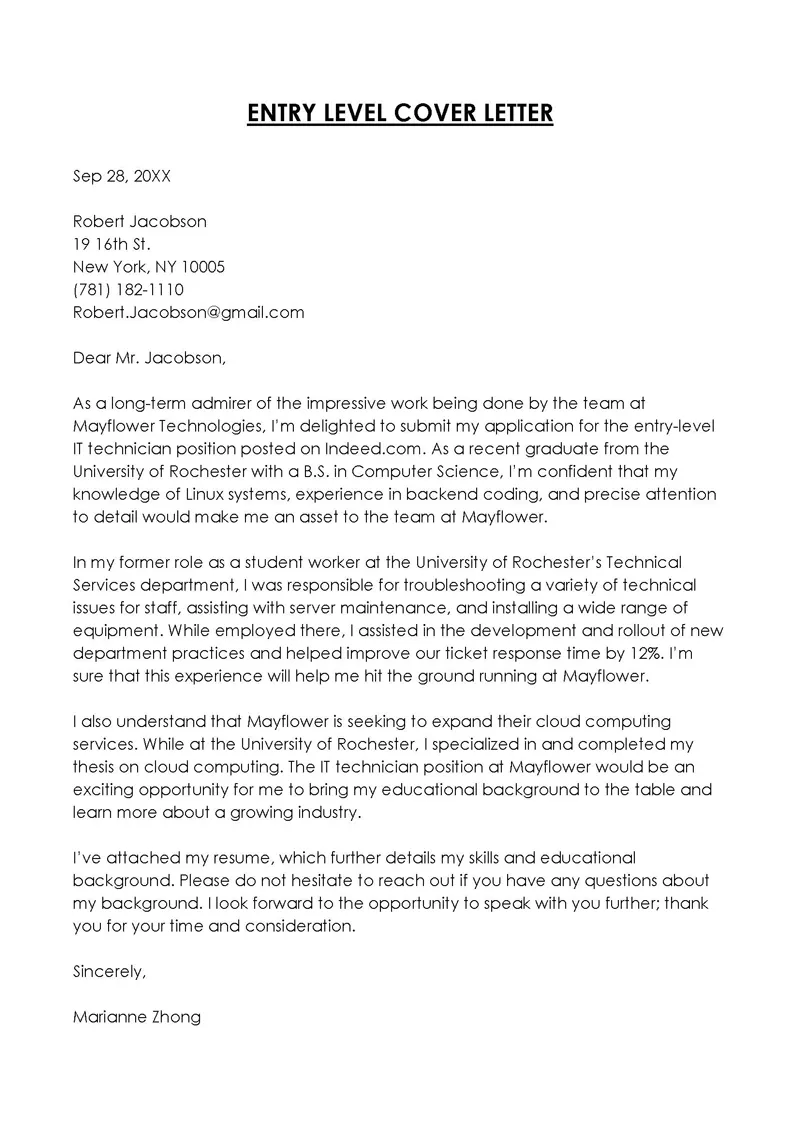
Dear [Hiring Manager Name],
I am writing to express my interest in the Accounting Assistant position at [Company Name]. I believe my skills and educational background align perfectly with the requirements outlined in the job description. My coursework provided me with a deep understanding of general accounting principles. I am proficient in data entry, financial reporting, and [Accounting Software]. Moreover, my ability to work independently and manage multiple tasks will allow me to excel in this role. I am excited about the opportunity to learn from your experts. I welcome an interview and can be contacted at [Phone Number] or [Email Address].
Sincerely, [Your Name]
Key Tips for Writing a Strong Cover Letter
Tailor Your Letter to the Job Description
Customize your cover letter for each job application. Carefully review the job description and align your skills, experience, and qualifications with the specific requirements. This demonstrates that you understand the employer’s needs and are genuinely interested in the position. Use keywords from the job description to show you meet their criteria. Avoid using a generic cover letter; personalize each one to the specific company and role. This will make your application stand out. By tailoring your letter, you make the hiring manager feel that you have the skills and abilities to be successful in the role. It’s crucial to show that you are a great fit.
Use Action Verbs
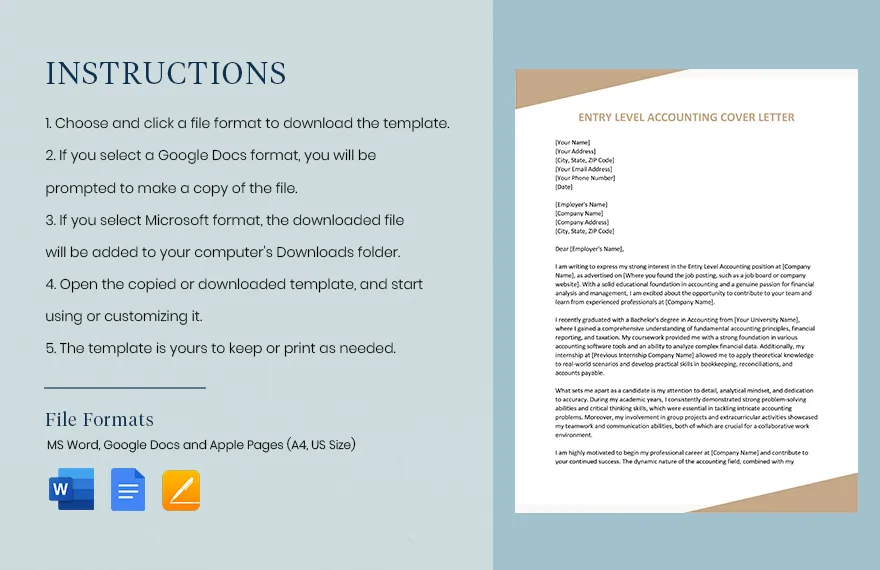
Start your sentences with strong action verbs to describe your accomplishments and responsibilities. Action verbs make your cover letter more dynamic and engaging, showcasing your abilities and achievements. Examples of effective action verbs include managed, prepared, analyzed, implemented, and improved. This approach makes your experience sound more impactful and conveys a sense of confidence and competence. Action verbs breathe life into your descriptions, making your application more compelling. This will also demonstrate that you have experience and accomplishments, making you a more attractive candidate. By implementing action verbs, you can make your statements clear and effective.
Proofread Carefully
Proofread your cover letter multiple times for any grammatical errors, typos, and inconsistencies. A polished cover letter shows attention to detail, a critical skill in accounting. Ask a friend or family member to review your letter as well, as a fresh pair of eyes can often spot errors you might have missed. Errors can create a negative impression, so thorough proofreading is essential. Always check for accuracy, consistency, and clarity. A well-proofread cover letter also shows your ability to prepare documents accurately. It’s a simple yet critical step that ensures your cover letter is viewed professionally. Errors and inaccuracies can lead to your application being discarded.
Formatting Your Cover Letter
Header and Salutation
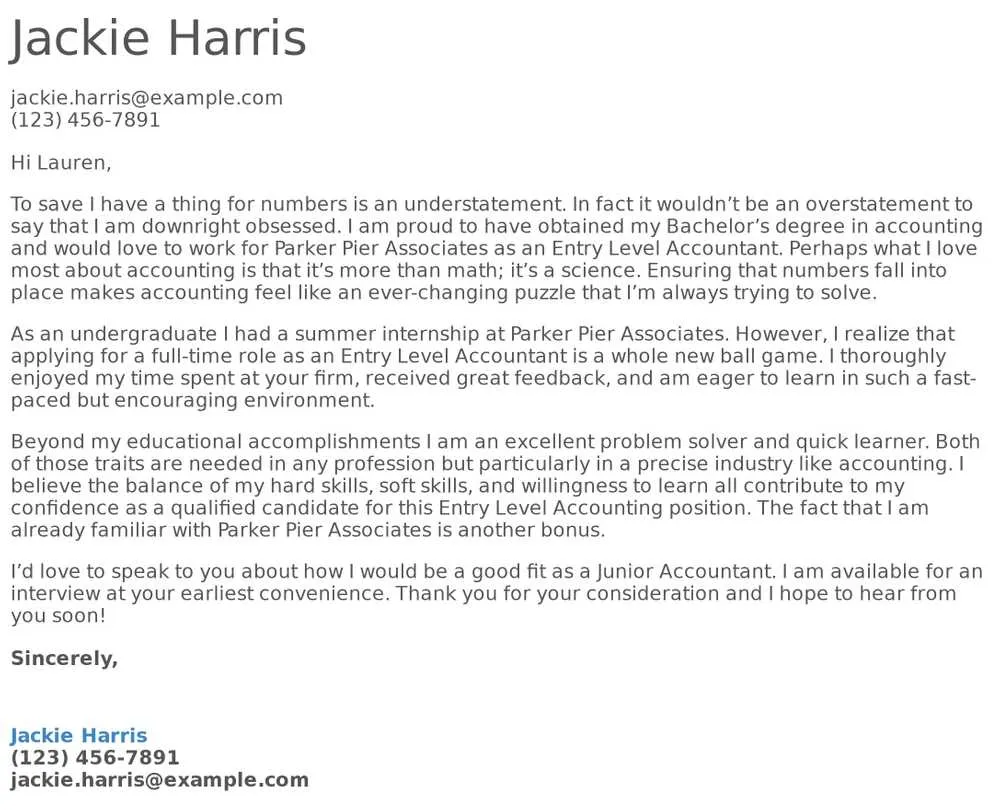
Use a professional header with your contact information, including your name, address, phone number, and email. Address the hiring manager by name whenever possible (e.g., ‘Dear Mr./Ms. [Last Name]’). This personalized approach demonstrates that you’ve taken the time to research the company. If you cannot find the hiring manager’s name, use a general salutation such as ‘Dear Hiring Manager’. Ensure your header is easy to read and that it matches the format of your resume. This ensures the letter looks professional and conveys your attention to detail. It’s important to show respect and professionalism, and the header and salutation are the first impression.
Body Paragraphs
Organize your body paragraphs logically, with a clear introduction, middle paragraphs, and a closing. Each paragraph should focus on a specific aspect of your qualifications or experience. Use concise and impactful language, avoiding jargon or overly complex sentences. Maintain a professional and positive tone throughout. Ensure that your paragraphs flow well, making the letter easy to read. Maintain a consistent tone throughout and make sure to tailor the message to fit the role. The body paragraphs are where you can effectively show your key skills and experiences, making them an essential part of the letter. Make sure to keep the language clear and effective, and to show how you are the ideal candidate.
Font and Spacing
Use a professional and easy-to-read font, such as Times New Roman, Arial, or Calibri, with a font size of 11 or 12 points. Ensure consistent spacing throughout the letter, typically single-spaced with a blank line between paragraphs. Proper formatting enhances readability and creates a clean and professional look. Avoid using unusual fonts or distracting formatting. This will help the reader quickly scan your information. A well-formatted document shows your attention to detail, which is vital in the accounting field. Use a font that is easy to read and ensures your information is well-presented. The use of white space is also crucial.
